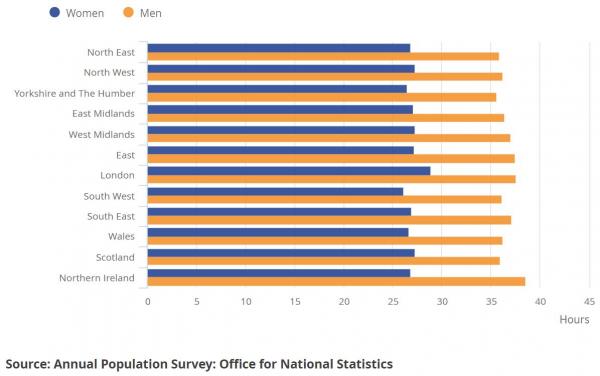WHO Study Shows Long Working Hours Kills 745,000 People a Year
In the first global analysis of the loss of life and health associated with working long hours, it's been shown that working excessive hours led to 745,000...
Read Full Article
For the period January to December 2016, the UK region with the highest average actual weekly hours worked (for all workers) was London at 33.7 hours, followed by Northern Ireland at 33.0 hours. Yorkshire and The Humber had the lowest number of hours worked at 31.3 hours.
This means that Londoners generally work an extra three weeks a year over and above their regional counterparts - and we know lots of those long hours are spent in the Capital's office buildings. The financial services industry prevalent in London is renowned as a hard task master; whilst the attractiveness to younger employees with a desire to work longer to progress their careers - and the salaries that will help pay for the high cost of accommodation.
The region with the highest average actual weekly hours worked in full-time jobs was London, at 38.4 hours. This represents an increase of 0.8 hours and a percentage increase of 2.1%, compared with the same period last year. The lowest were Scotland, the North East and the North West, all at 36.9 hours.
For part-time jobs, the region with the highest average hours worked was Northern Ireland at 17.0 hours and the lowest was the South East at 15.8 hours.
For men, the region with the highest average hours worked was Northern Ireland, at 38.6 hours and for women it was London, at 28.9 hours. The largest difference in average hours worked between men and women was in Northern Ireland, where men worked on average 11.8 more hours a week than women. The largest change compared with the same period last year (January 2015 to December 2015), was seen for men in the East Midlands, where the average hours worked decreased by 2.6%: from 32.6 hours to 32.0 hours and for women in Northern Ireland, where the average hours worked decreased by 2.3%: from 27.4 hours to 26.8 hours per week.
The region with the largest difference in total hours worked between men and women was London, where men worked a total of 34.0 million more hours than women. The region with the smallest difference was Northern Ireland, where men worked only 7.0 million more hours than women.
Actual hours worked
Actual hours worked measures the number of hours worked in the economy. Changes in actual hours worked reflect changes in the number of people in employment and the average hours worked by those people.
Picture: Average (mean) actual weekly hours of work, by region and by sex, January 2016 to December 2016
Article written by Cathryn Ellis | Published 19 April 2017
In the first global analysis of the loss of life and health associated with working long hours, it's been shown that working excessive hours led to 745,000...
Read Full ArticleMore than thirty years ago, Dolly Parton sang about working 9 to 5 because those hours represented the typical working day. But new research from YouGov Omnibus...
Read Full ArticleTelecoms billionaire Carlos Slim recenlty became the latest, perhaps unlikely, advocate of transforming our work-life balance, writes Anna Coote, Principal Fellow of the...
Read Full Article